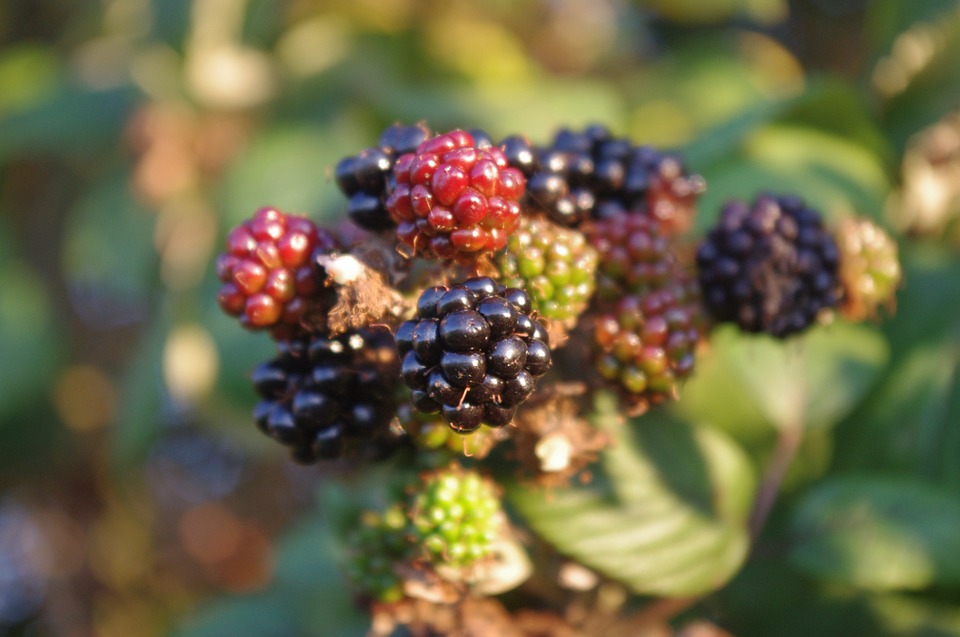This comprehensive guide explores the world of blackberry consumption for rabbits, delving into their nutritional benefits, potential risks, and safe ways to incorporate them into your bunny's diet. We'll navigate the intricate relationship between blackberries and rabbit health, addressing common queries and offering expert advice.
Part 1: The Nutritional Value of Blackberries for Rabbits

1.1. A Sweet Source of Vitamins and Minerals
Blackberries are a nutritional powerhouse, packing a punch of essential vitamins and minerals that contribute to your rabbit's overall health and well-being.
- Vitamin C: A crucial antioxidant that supports immune function and collagen production, vital for healthy skin, bones, and connective tissues.
- Vitamin K: Essential for blood clotting and bone health, playing a crucial role in the body's ability to heal wounds and maintain bone density.
- Potassium: Plays a vital role in maintaining fluid balance and muscle function, essential for regulating blood pressure and ensuring proper muscle contractions.
- Manganese: Involved in bone formation, wound healing, and metabolism, contributing to a healthy skeletal system and efficient energy production.
- Fibre: Essential for digestive health, promoting regular bowel movements and preventing digestive issues, crucial for maintaining a healthy gut microbiome and preventing hairballs.
1.2. Benefits of Blackberries for Rabbits
Beyond their nutritional profile, blackberries offer numerous benefits for your rabbit:
- Improved Digestion: The high fibre content aids digestion, promoting healthy bowel function and preventing digestive problems like hairballs. The insoluble fibre in blackberries acts as a natural broom, sweeping through the digestive tract and ensuring regular waste elimination.
- Enhanced Immune System: Vitamin C acts as an antioxidant, strengthening the immune system and protecting against illnesses. This vital nutrient helps the body fight off harmful free radicals, reducing the risk of infections and maintaining overall health.
- Stronger Bones and Teeth: Vitamin K and manganese are essential for bone health, while the abrasive nature of blackberries can help to wear down teeth, preventing overgrowth. The fibrous texture of blackberries acts as a natural toothbrush, helping to keep teeth clean and healthy.
- Increased Energy Levels: The carbohydrates and sugars in blackberries provide a quick energy boost, especially for active rabbits. This natural energy boost can help to fuel playful activities and keep your bunny hopping around with energy.
Part 2: Potential Risks of Blackberries for Rabbits

2.1. Sugar Content and Dental Issues
While blackberries are a good source of nutrients, their sugar content can pose a risk if consumed in excess. Excessive sugar intake can lead to:
- Weight Gain: High sugar levels can contribute to obesity, leading to health problems such as cardiovascular disease, diabetes, and joint issues. Maintaining a healthy weight is crucial for your rabbit's longevity and quality of life.
- Dental Problems: The sugars in blackberries can contribute to plaque buildup on teeth, increasing the risk of dental disease. This can lead to pain, infections, and ultimately tooth loss, requiring veterinary intervention.
2.2. Pesticide Residues and Toxicity
Blackberries grown commercially may contain pesticide residues, which can be harmful to rabbits. It is crucial to choose organic blackberries or wash them thoroughly before feeding them to your rabbit. Additionally, some blackberry varieties contain cyanogenic glycosides, which release cyanide when ingested. These varieties, such as the 'Himalayan Blackberry', should be avoided altogether.
2.3. Stomach Upset and Digestive Issues
Blackberries, especially when consumed in large quantities, can cause digestive upset in rabbits. This can manifest as diarrhoea, bloating, or gas. It is essential to introduce blackberries gradually and observe your rabbit for any signs of discomfort. The sudden change in diet can disrupt the delicate balance of bacteria in their gut, leading to digestive problems.
Part 3: The Importance of Moderation
3.1. Treat, Not Staple
Blackberries should be considered a treat, not a staple food. Their nutritional benefits can be enjoyed without compromising your rabbit's overall health by limiting their intake to once or twice a week and ensuring they represent a small portion of their overall diet.
3.2. Balancing the Diet
A balanced diet for your rabbit primarily consists of hay, fresh vegetables, and a small amount of rabbit pellets. This provides the essential nutrients needed for a healthy and happy life. Blackberries should complement this balanced diet, not replace it.
3.3. Listen to Your Rabbit
Pay attention to your rabbit's preferences and their individual needs. Some rabbits may be more sensitive to certain foods, so it's crucial to observe them for any signs of digestive upset, such as diarrhoea, bloating, or gas.
Part 4: Choosing and Preparing Blackberries for Your Rabbit
4.1. Organic is Best
Opt for organic blackberries whenever possible to minimize exposure to pesticide residues. If organic blackberries are unavailable, thoroughly wash conventional blackberries to remove any contaminants.
4.2. Preparation is Key
Remove any leaves or stems, as these can be difficult for rabbits to digest. You can offer blackberries whole or mashed, depending on your rabbit's preference. Mashed blackberries can be easier for smaller rabbits to consume and can be incorporated into their hay for added flavour and nutrition.
4.3. The Right Amount
Start with a small amount of blackberries (one or two) and monitor your rabbit's reaction. If they show no signs of adverse effects, you can gradually increase the amount over a few days. This gradual introduction allows their digestive system to adjust to the new food without causing discomfort.
Part 5: FAQs About Feeding Blackberries to Rabbits
5.1. Can Rabbits Eat Blackberry Leaves?
No, blackberry leaves are not safe for rabbits to eat. They contain high levels of tannins, which can be toxic to rabbits. Stick to the berries themselves.
5.2. How Often Can I Give My Rabbit Blackberries?
It's best to limit blackberries to once or twice a week as a treat. Overfeeding can lead to digestive issues and weight gain.
5.3. Can I Give My Rabbit Frozen Blackberries?
Frozen blackberries are perfectly safe for rabbits to eat. However, make sure to thaw them completely before offering them to your rabbit. Frozen blackberries can be a refreshing treat, especially on hot days.
5.4. Can I Give My Rabbit Blackberry Jam or Jelly?
No, blackberry jam or jelly is not suitable for rabbits. They contain high levels of sugar and artificial ingredients that can be harmful to their health. These products are designed for human consumption and are not appropriate for rabbits.
5.5. What Other Fruits Can Rabbits Eat?
Besides blackberries, rabbits can safely enjoy other fruits in moderation, such as apples (without seeds), bananas (in small amounts), and strawberries. Always introduce new fruits gradually and observe your rabbit for any adverse reactions.
5.6. Are Blackberries a Good Source of Vitamin C for Rabbits?
Blackberries are a good source of vitamin C, but it's important to note that rabbits can produce their own vitamin C. Providing a balanced diet of hay, pellets, and fresh vegetables is sufficient to meet their vitamin C needs.
5.7. Can Baby Rabbits Eat Blackberries?
Baby rabbits should not be given blackberries until they are at least 6 weeks old. Their digestive systems are still developing and they are more susceptible to digestive issues.
5.8. Can Rabbits Eat Blackberry Seeds?
While blackberry seeds are generally safe for rabbits to consume, they can be a bit difficult to digest. If you're concerned about seed digestion, consider removing the seeds before offering the berries to your rabbit.
Conclusion
Blackberries can be a delicious and nutritious treat for rabbits when fed in moderation and with proper preparation. By following these guidelines and consulting with your veterinarian, you can ensure that your furry friend enjoys the benefits of blackberries without any adverse health effects.
Everyone is watching
-

Do Rabbits Lay Eggs? (The Surprising Truth)
OTHER TYPES OF PETSThis article will unravel the common misconception that rabbits lay eggs, exploring the fascinating world of r...
-

Can Rabbits Eat Grapes? A Guide to Safe Rabbit Treats
OTHER TYPES OF PETSThis comprehensive guide will explore the safety and suitability of grapes for rabbits, providing detailed inf...
-

What's a Group of Rabbits Called? (A Comprehensive Guide)
OTHER TYPES OF PETSThis article delves into the fascinating world of rabbits, exploring the various terms used to describe a grou...
-

Predators That Hunt Rabbits: A Guide to Natural Enemies
OTHER TYPES OF PETSI've always been fascinated by the circle of life, that delicate dance between predator and prey. Growing up ...
-

Are Rabbits Nocturnal Animals?
OTHER TYPES OF PETSThe question of whether rabbits are nocturnal animals is a fascinating one, with a surprisingly complex answer...
